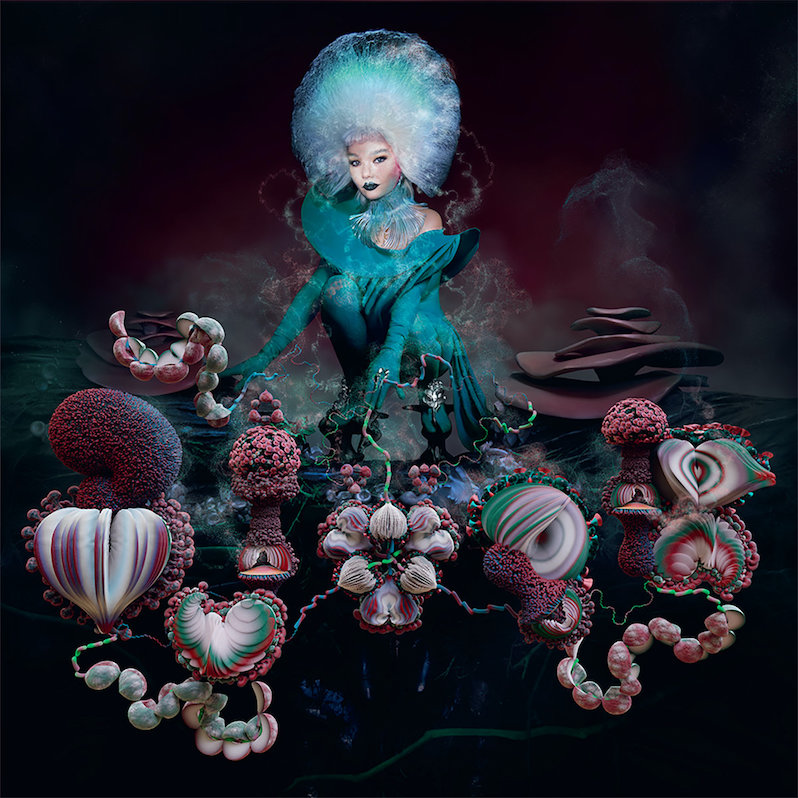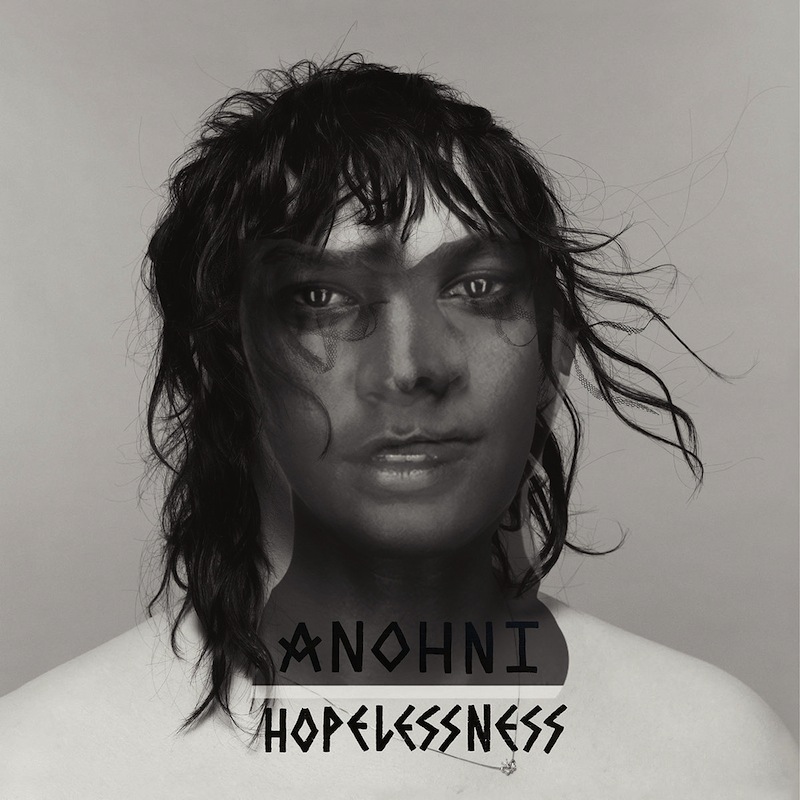Björk – Fossora

Björk has always, to my ears, made music that reminds me of church, but not the tabernacle of the temple as much as the tabernacle of the wild, the unbidden church of the earth, which testifies by mushroom and geological layers and tectonic movements and the churning immortal tides of the ocean. Fossora enjoins its partner albums in the same way that a new symphony from Beethoven or a new opera from Mozart or a new etude from Chopin sits among its peers; a nuanced shift of the lens but ultimately revelatory concerning the center invisible pillar, the organizing mind that seems more at times like an interlocutor of the angels than a composer.
And yet, why does the grace of this record, producing such tearjerking and truly magical pieces such as “Sorrowful Soil,” a song about the transmission of maternal wisdom from mother to woman to daughter, chains of generational grace, seem so shocking to me? It’s a question I returned to again and again as the album played, finished, started again, over and over. Inevitably I came to a certain insight: while Björk is a well-esteemed artist, it was sometime around Volta that discussion of her shifted seemingly mostly to more academic spaces while, in the world of pop, hers became the hushed name of a goddess. This sense of esteem is warranted, but it also seemed to lead to a muted critical witnessing of her contemporary work. How many pieces have we read, for instance, about Homogenic and Vespertine? These are albums that deserve keen appraisal and to be returned to again and again over the years to introduce new listeners to them, much as we should do for all the greats of the marbled halls of music.
Answer in your heart: When is the last time you read something of similar heft about the complex intertextual project of Biophilia? Of the bristling psychic cocoon of Vulnicura? Of the intensely regenerative force of Utopia? Moreso, when is the last time you sat and gave any of those records a focused listen? This is not meant as a castigation; the tides of culture sweep us along as surely as the tides of our lives. Her stature as a respected, near god-like force has draped a cloak across her work that is, in a word, troublesome, given its continuous high quality. We’ve seen a tide recapturing Kate Bush, rendering her in the flesh after years of being a distant marble statue. She, too, experienced something similar, gradually fading away to many listeners to little more than a couple singles, to the point that many listeners seem to struggle to recall she put out not one by two remarkable records after her long hiatus. (“A Sky of Honey” as well as “Snowed in at Wheeler Street” rank as two of her greatest compositions.)
Björk, meanwhile, has been shipwrecked on a distant isle. Despite her music bristling with contemporary jazz flavor and spirit, forms we see recapitulated from artists like The Comet Is Coming and the avant-garde future nu-jazz gave us with its electronic fusions, she remains unclaimed by jazz as a figure. ProgArchives, an imperfect but useful barometer of the feelings of the prog world, only recently listed her as a progressive artist, something gallingly obvious, but few of her records crest over the mid 3 out of 5 range, indicating that base still hasn’t accepted in their hearts that which their ears should already be confirming for them. The contemporary classical space, despite drawing often from her fusion states of pop, art music, the avant-garde, the underground, and all the myriad genres swirling within it, likewise seems reticent to properly bestow Björk with the venerated title of “composer.” And so we see her music crashing on the shores of the idolized, further indications of her continuous genius but without proper engagement.
To get the obvious out of the way: The new Björk record is, once more, a superlative work, as deeply imaginative as any of her records, capable of inspiring the same kind of fawning admiration we give to peak-era Stevie Wonder or Prince or Miles Davis. On Fossora, Björk has seized up the latent contemporary classical composer that has always lurked within her, who reared its mighty shiny-scaled head proudest on Medulla, her magical 2004 record purely comprising vocal arrangements. This seized up form, taking up chorales, brass instruments and wielding bass clarinet sextet Murmuri, is then rendered in post-Kanye form, digitized in places, chopped and screwed, passed through the filter of Aphex Twin and his children, be they SOPHIE or Arca. There is clearly no desire in Björk to resolve these tensions between the electronic and symphonic, the digital and the analog, largely because she clearly sees no tensions.
Fossora is the sound of forests retaking the earth after mankind’s ruin. An ecofascist dreams of this apocalypsis with desire, but we think of it somewhat differently, an inevitability that is dripping with deep tragedy, Shakespearean, Grecian, unavoidable, but one which might contain the germinal seed of some redemptive future. Or perhaps this conflict even is something I have superimposed from my own vantage point. Because, again, this record bears no sense of antagonism toward either its dancing flutes and wafting clouds of braided voices nor its industrial throbs and jarred statics. Björk is almost certainly aware that a casual listener might prick their ears up at these juxtapositional sonic elements and even her initial words regarding the development of this album seem to indicate that she meant it that way at first, saying this was to be a clarinet album before deciding, to quote her, “fuck that.” But this sense of self-complication eventually evens itself out via the mechanism of the mushroom, the emblematic symbol of this record; each element spores into the other, perforating it, not so that the two opposites are alloyed to one another but so that they simply aren’t opposites anymore. Synths gird real strings, techno beats and gabber thrashing guide woodwinds like orchestral percussion. Much like her previous beguiling musical table, part app and part device, now the laptop simply joins the orchestra on stage as a full-member. All sounds are equal.
This in turn mirrors the existential thrust of the record. Freed, at least temporarily, of the pain of her very complex divorce from avant-garde director Matthew Barney, Bjork lets her musical and lyrical focus drift to both her mother and her children. We can see mirrors of the orchestral and the digital in that pair, the old and the new in a crass way. What, then, does this render Björk? A mere dividing line between, the liquid tension between two seeming infinities? This is emblematic of the root existential-nèe-nihilistic tension of human experience. Behind us, a seeming infinite, the past and all our lineage, how all of the universe conspired for 14 billion unbroken years and god knows what before the Big Bang to give birth to us, this specific sperm reaching this specific egg. And then, beyond, the infinitude of the future, where we are no longer subject but background, context, one little marble piece in the growing mural, whose shape and position dictate that which next pieces can be placed but by nature is precluded from ever seeing how our presence altered the overall mural let alone the full mural of space and time itself. It renders life an unanswerable riddle, a confusion of coffin dust and star dust, where we sit pondering these twin riddles on either side of us that feel like one great riddle in a conjecture that is ultimately unprovable.
And so comes the symbol of the mushroom, that which burrows through both the new and old, whose mycelia dig deep into every corpse and render it the fertile bloom of continuing life. We see mushrooms rendered in fiction as a vehicle of horror, focused on disfigurement, how the mushroom-rotted eyes and bones and flesh of the now-dead deform into shapes we cannot recognize. But in doing so, we ignore the sweetness of the mushroom (often literally turning the putrescine of corpses into a sickly-sweet perfume sporing out) as much as their role converting what would otherwise be morose reminds of the temporary and pain-riddled nature of life into firmament for new life. Life is a wheel, sure, but what turns the wheel? Beguilingly, it is fungi. Fossora weaves a complex set of interior symbols, elements drawn as much from Björk’s life as from totemic items meant to capture elements of living as a human itself. There are representatives of the stars and the soil, of mother and child, of the confounding riddle of whether we matter even to ourselves or whether we are meant to witness and to live without necessary aim. Love pervades this record. It feels like your mother’s arms wrapping around you, calming you, asking you to sit and witness and think and feel.
Essaying comes easy with Fossora; it gently unweaves it from you, asks you to divest yourself of those thoughts, to share them with your mother. Not Björk; she too is sharing thoughts with her mother here. It is another, vaster thing, like prayer. What does this album mean? Ask me again in a year, in five years, in ten, in twenty. There will be thousands more words to write down. Björk erects mansions, labyrinths of glass and sand and mushroom and wallpaper and photographs from your childhood home. There is always more.
Label: One Little Independent
Year: 2022
Similar Albums:
Langdon Hickman is listening to progressive rock and death metal. He currently resides in Virginia with his partner and their two pets.




